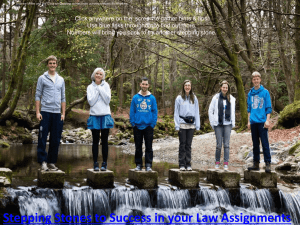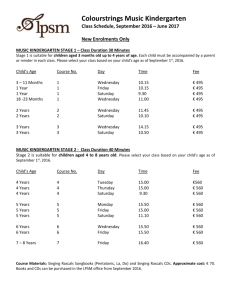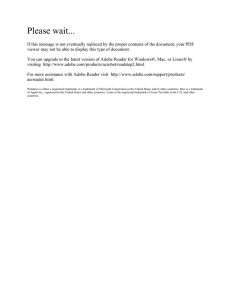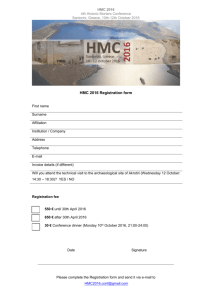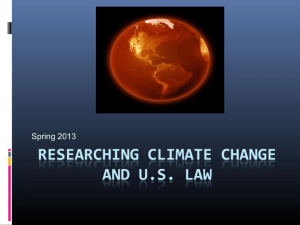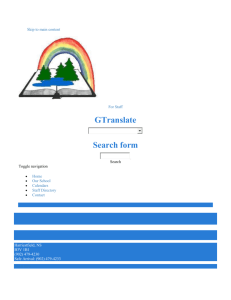scholarlywriting_screenreadable
advertisement
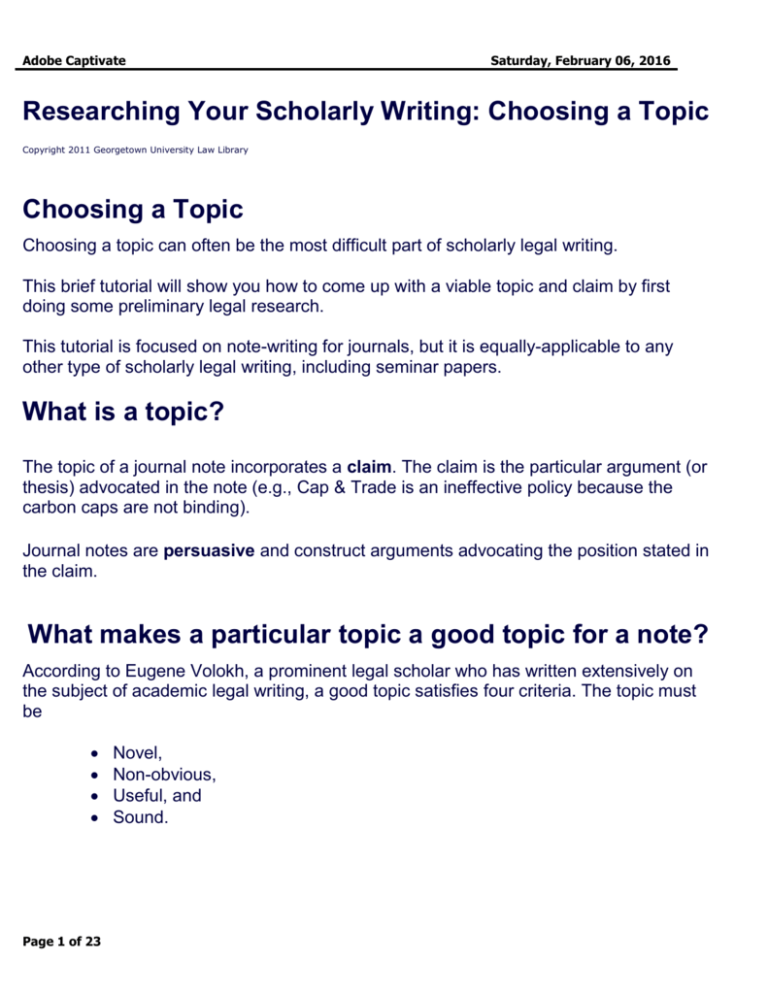
Adobe Captivate Saturday, February 06, 2016 Researching Your Scholarly Writing: Choosing a Topic Copyright 2011 Georgetown University Law Library Choosing a Topic Choosing a topic can often be the most difficult part of scholarly legal writing. This brief tutorial will show you how to come up with a viable topic and claim by first doing some preliminary legal research. This tutorial is focused on note-writing for journals, but it is equally-applicable to any other type of scholarly legal writing, including seminar papers. What is a topic? The topic of a journal note incorporates a claim. The claim is the particular argument (or thesis) advocated in the note (e.g., Cap & Trade is an ineffective policy because the carbon caps are not binding). Journal notes are persuasive and construct arguments advocating the position stated in the claim. What makes a particular topic a good topic for a note? According to Eugene Volokh, a prominent legal scholar who has written extensively on the subject of academic legal writing, a good topic satisfies four criteria. The topic must be Page 1 of 23 Novel, Non-obvious, Useful, and Sound. Adobe Captivate Saturday, February 06, 2016 Novelty Your topic should add to the body of professional knowledge by saying something that hasn’t been said before. A topic can be novel if: There isn’t a lot written on your topic; There are a lot of papers written on your topic, but your claim is new; or Your claim, coupled with your basic rationale, is a novel approach to the subject. Novelty By using a little nuance in the way you structure your topic, you can make your topic novel: Come up with a claim that isn’t a strong “yes” or “no”, but is a little more grey. Limit your claim to your strongest arguments. Present special factors that exist in your claim but not in other situations (e.g., government interests are present in some situations covered by your claim but not in others). Non-Obvious Your claim should lead to a conclusion that is non-obvious. Claims that just apply settled law or well-established arguments to slightly-different fact patterns tend to look obvious. Add a twist that other people would not have thought of. You may want to discuss your idea with a professor who specializes in the field, a lawyer, or a classmate to get their feedback on your paper topic. Page 2 of 23 Adobe Captivate Saturday, February 06, 2016 Utility Your note should, ultimately, be useful for the reader. In other words, why would someone want to read what you’ve written? Some ways to make your note useful: It focuses on issues left unresolved or open by other articles, cases, etc. It applies an argument to a jurisdiction that previous articles, cases, etc. didn’t consider. It incorporates prescriptive implications of your descriptive findings. It provides politically feasible policies. Soundness Your note should be “sound.” This means that the claim, argument, and structure of your note are based on a firm foundation of law and logic, and has the weight of authority underlying it. Typical Topics for Notes Most notes’ topics tend to fall into the following categories: Jurisdictional conflicts in an unresolved area of law: o Circuit splits o Different states o Differences in state and federal treatment Applying existing law to a new factual situation Applying a new law to an existing factual situation to show the effects Historical law Legal philosophy and jurisprudence Original empirical research Page 3 of 23 Adobe Captivate Saturday, February 06, 2016 Topics and Claims to Avoid Sadly, not every idea is a good one. Many poor topics fall into the following categories: Notes that show that there is a problem, but don’t articulate any solutions. Notes focusing on the law of only one state. Case notes that merely describe and criticize a single case opinion. Notes that simply just explain what the law is. Overly-narrow responses to or criticisms of a particular author’s work. Topics that the Supreme Court or Congress are likely to visit while you are writing or soon thereafter, because your note will be out-of-date and preempted very quickly. Investigate the timeliness of your topic If your topic is based on a circuit split, you will need to do some additional research to ensure that you did not select a topic that the Supreme Court may preempt by hearing one of the cases: Using Keycite or Shepards, check the case history of every circuit case forming the split: Has a petition for certiorari been filed? If not, has the time to file a petition expired? If petitions for certiorari have been filed, has the Supreme Court denied cert for each circuit case? If a petition for certiorari has been filed, there is a chance that the Supreme Court may take up the issue. You will need to keep monitoring the petition to see whether or not the Supreme Court has granted it. Investigate the timeliness of your topic Ask faculty who specialize in the subject whether they think the Supreme Court will hear a case on your subject soon. Page 4 of 23 Adobe Captivate Saturday, February 06, 2016 Coming up with topic ideas There are many research sources that can suggest potential topics. The first place to start is with your own classroom experiences: Class discussions that you found interesting, but didn’t seem to have a well-settled answer Cases that you read that you felt left questions unresolved or that the reasoning was unpersuasive Look at the discussion questions that your casebooks include after each case Coming up with topic ideas There are many subject-specific law blogs on the internet that are maintained by law professors. Law Professor Blogs (www.lawprofessorblogs.com) is a particulary good source for finding blogs “by law professors for law professors” on a wide variety of legal subjects, including tax, copyright, constitutional law, etc. Other well-regarded legal blogs include The Volokh Conspiracy (volokh.com) and SCOTUSblog (www.scotusblog.com). Coming up with topic ideas Your work experiences can also be a source of inspiration. For example, a memorandum you researched may have legal issues that can be examined more deeply. Lawyers you worked with may also be able to suggest unsettled questions they find themselves facing. Page 5 of 23 Adobe Captivate Saturday, February 06, 2016 Coming up with topic ideas via databases Using Lexis and Westlaw to search for circuit splits and cases of first impression is a good way to find a case you can use as a starting point to flesh out a topic. Searches that make good starting points: (circuit /5 split) (use a district court database, such as DCT [westlaw] or legal>cases -US -> US District Court Cases, Combined [Lexis] and limit the date to the current year) “courts diverge” “first impression” (use a district court database, such as DCT [westlaw] or legal>cases -US -> US District Court Cases, Combined [Lexis] and limit the date to the current year) Note that these searches may result in over 100 hits each. So, you may want to combine these searches, use locate in results, or add search terms specifically on your subject of interest (e.g., tax, environmental law) to narrow down the results. Coming up with topic ideas via databases United States Law Week publishes summaries of cases that their editors consider interesting. Many of these are cases for which the U.S. Supreme Court denied certiorari. You can search these summaries for circuit splits or cases of first impression in the BNAUnited States Law Week database. The search strings listed on the previous slide make good starting points. Coming up with topic ideas via databases Westlaw also has “Westlaw Topical Highlights,” consisting of several “current legal news” databases, which are organized into various practice groups. Topics include antitrust, business, bankruptcy, copyright law, family law, criminal law, tax, and intellectual property. Westlaw Topical Highlights can be accessed from the main directory screen -> Legal Periodicals & Current Awareness -> Westlaw Highlights & Bulletins -> Westlaw Topical Highlights. Page 6 of 23 Adobe Captivate Saturday, February 06, 2016 For more information For more detailed information on topic selection, please read: Eugene Volokh, Academic Legal Writing: Law Review Articles, Student Notes, Seminar Papers, and Getting on Law Review (4th ed. 2010) Heather Meeker, Stalking the Golden Topic: A Guide to Locating and Selecting Topics for Legal Research Papers, 1996 Utah L. Rev. 917. This concludes this section of the tutorial. Additional sections will detail the next stages of scholarly writing, including preemption checking, and In-depth research strategies. Part 2 Preemption Checking Copyright 2011 Georgetown University Law Library Introduction Now that you’ve chosen a topic, it’s time for Preemption Checking to determine if your idea for a journal note or paper is original. Law reviews and journals will only publish original articles and notes. Also, many seminar papers are required to be "publishable," with professors insisting on original arguments or ideas. Only your thesis, not your topic, must be original. In other words, your argument must be unique. By thoroughly reading articles and papers discovered during a preemption check, you will be able to focus your topic in a unique way. Page 7 of 23 Adobe Captivate Saturday, February 06, 2016 The bonus of doing a thorough preemption check is that you will have a head start on the research for your scholarly writing, which will be further explained in another section of this tutorial. When doing a preemption check, it is important to search many different sources in many different ways to make sure that you find everything written on your narrow topic. If you only look in one database, you might find everything in that database, but you will miss documents that are only available in another source. For example, a working paper will not appear on Westlaw because only published articles are included in Westlaw's journals and law reviews database. Prior to publication, many articles first appear on a working paper site such as SSRN or bepress. Getting Started To perform a thorough preemption check it’s important to search: 1) Lexis or Westlaw's law review database 2) HeinOnline's law journal library 3) A legal periodical index such as Legal Periodicals and Books or Legal Trac 4) Google Scholar 5) A database of unpublished works such as SSRN's Legal Scholarship Network or bepress (Berkeley Electronic Press)'s Legal Repository. Page 8 of 23 Adobe Captivate Saturday, February 06, 2016 A Word of Advice You should also consider talking to a professor or librarian who is an expert on the topic you're writing about. They can offer advice on specialized places to search or they may be aware of unpublished reports or papers presented at conferences or workshops. Lexis & Westlaw Both Lexis and Westlaw have databases that contain the full text of law review articles. These databases, however, do not contain every law review article ever published. Because the coverage of the databases is not identical it is possible that Lexis will have older articles that are not available on Westlaw and vice versa. The coverage for newer articles (2000 to the present) is similar on both systems. Let’s take a look at the law review files on both Westlaw & Lexis. Westlaw a. Westlaw's "Journals and Law Reviews" database includes materials published in U.S. & Canadian law reviews, CLE (continuing legal education) materials, and bar journals. The coverage of particular journals varies, but generally it includes every article printed in a journal from about the 1990s forward and selected articles from the 1980s forward. It includes much older articles from a few journals, such as the Harvard Law Review and Yale Law Journal. b. Lexis On Lexis, the "US Law Reviews and Journals, Combined" includes articles published in U.S. law reviews back to 1982. The coverage of particular journals varies and can be verified by clicking on the (i) button. Page 9 of 23 Adobe Captivate Saturday, February 06, 2016 HeinOnline HeinOnline's Law Journal Library is another database of U.S. and Canadian law review articles. It generally contains the full run of the journal (Volume 1 - ) with the exception of the most recent one or two issues. The articles are presented as scans of the print version, so they contain material that may be missing from Lexis or Westlaw versions, such as tables or charts. If Lexis or Westlaw omit a chart or other graphical material, there will be a note such as "Chart Omitted." HeinOnline's format is especially helpful if there is a law review symposium on your topic as you can easily browse the entire symposium issue online. Legal Periodicals & Books The databases Legal Periodicals and Books and Legal Periodicals and Books Retro index journal articles and books back to 1908. However, they do not include all books on legal topics. The value of this database for preemption checkers is that a subject heading is assigned to each item in the database. Find a subject heading that covers your topic and you can find all of the articles on your topic. This database is sometimes called Index to Legal Periodicals (its print predecessor) or Wilson Web (the name of the company that owns and provides the database). LegalTrac LegalTrac is another database that indexes articles. It covers about 875 law reviews and law related articles from about 1000 other journals. It goes back to 1980. Page 10 of 23 Adobe Captivate Saturday, February 06, 2016 The value of this database for preemption checkers is also that a subject heading is assigned to each article. The subject headings are different than those used in Legal Periodicals and Books, so if you don't find an appropriate subject in one database, try the other. Google Scholar Google Scholar is a quick and easy way to search many scholarly databases at once. It uses Google's technology to search scholarly databases from many different disciplines as well as Google Books and other online collections of scholarly materials. For law, it includes some HeinOnline content and SSRN, but it does not include Lexis, Westlaw, or any of the law review indices. It is especially important to use this resource if your scholarly writing is on an interdisciplinary topic such as law and economics or on a topic best covered in another discipline. For example, general environmental journals would focus on the topic of carbon emissions and could provide useful research. Google Scholar won't give you direct access to the articles in the databases but Georgetown has integrated their database subscriptions into the Scholar Preferences and articles which we subscribe to are linked as indicated below. Unpublished Articles Because it can sometimes take more than a year for an article to be published, you should also check databases of unpublished articles and working papers. This will alert you if an article similar to yours has already been written but not yet published. Most of the papers on SSRN and bepress are eventually accepted for publication. If you use material from these websites in your own paper or note, be sure to cite to the published version. Page 11 of 23 Adobe Captivate Saturday, February 06, 2016 The best sources for these types of document are SSRN's Legal Scholarship Network at http://www.ssrn.com/lsn/index.html and bepress' Legal Repository at http://law.bepress.com/repository/. For some additional resources on Preemption Checking, we suggest taking a look at these guides. • http://www.law.northwestern.edu/library/research/writing/preemption/ • http://m-library.law.yale.edu/content/preemption-checking • http://www.lib.uchicago.edu/e/law/db/ej/preemption.html • http://www.law.syr.edu/Pdfs/0LawReviewPreemptionCheck.pdf Congratulations! You know now why it's important to conduct a preemption check in scholarly writing and have a roadmap to complete yours. Don't forget to search Lexis or Westlaw, HeinOnline, Google Scholar, Index to Legal Periodicals and Books or LegalTrac and either SSRN or bepress' Legal Repository. Be sure to use both keyword searching and subject searching when you can. Finally, be sure to mine citations in the articles and books you find helpful. For an additional tutorial on Preemption Checking, you can refer to www.cali.org. This concludes this section of the tutorial. Page 12 of 23 Adobe Captivate Saturday, February 06, 2016 Part 3 In-depth Research Component Copyright 2011 Georgetown University Law Library Introduction In this tutorial, you have learned how to select a topic, and complete a preemption check Next, you will learn how to conduct the rest of the research necessary to write a scholarly journal note or seminar paper. Overview This section of the tutorial is comprised of two main parts. The first part covers the background research you will need to complete to have a solid understanding of the area of law or subject generally, and the second part discusses how to focus your research. The tutorial will then conclude with some final important tips for conducting successful scholarly research. Important Note You may notice as you proceed through this section that the process is described as very linear. As you know from your own experience, research is not necessarily so undeviating. Rather, you proceed forward and backward as you find new information and begin to draft your paper. To ensure that your research is complete and of high quality, however, remember to keep these suggestions in mind and carefully organize your research. Page 13 of 23 Adobe Captivate Saturday, February 06, 2016 Additionally, this tutorial necessarily does not contain a complete list of resources for every topic. It provides an introduction to scholarly research and sources and search techniques applicable generally. With that in mind, let’s begin. Background Research To get started, you will need to conduct background research to familiarize yourself with the subject and area of law. You certainly already know something about your topic from either personal knowledge or class and from the research you did to select the topic and conduct a preemption check. This phase of your research, however, goes further and is meant to ensure that you have a solid understanding of the general area of law or subject. Specifically, you should find and read a good introductory treatise on the topic as well as other relevant books and law review and journal articles. Finding a Treatise You already learned how to find legal journal articles in the premption checking section of this tutorial. You may also want to read articles related to your topic from non-law journals, and the next part on focused research will discuss finding journal articles and books from other disciplines. For now, let’s learn how to find a good introductory treatise on a particular area of law. Continuing with the example of the regulation of greenhouse gas emissions, the next slides will teach you how to find an environmental law treatise in the Georgetown University Law Library. There are a number of ways to find a good treatise, but one of the best is to use the law library’s Treatise Finder. Page 14 of 23 Adobe Captivate Saturday, February 06, 2016 The Treatise Finder contains a list of preeminent treatises and study aids organized topically into over 50 practice areas. Let’s look at the environmental law treatises. Here are some of the treatises listed in the Treatise Finder under “Environmental Law.” For each treatise, the Treatise Finder provides the title, author, location, and a brief description. It also indicates whether a treatise is a preeminent treatise or a good study aid. The medal symbol means it is a preeminent treatise. The light bulb symbol means it is a good study aid. Click the call number to view the availability of the print version and the database link to connect to the electronic version. Another good method for finding a treatise (as well as other information on your topic) is to use one of the law library’s Research Guides. Click on Research Guides > By Title to see a list of all topical research guides. The library has created research guides on numerous topics, including environmental law. Most research guides begin with an introduction to the topic and a list of treatises to help you get started with your research. Research guides contain much more than a list of useful treatises. Page 15 of 23 Adobe Captivate Saturday, February 06, 2016 The Environmental Law Research Guide, for example, also includes information on major laws and regulations, how to find other books and journal articles on environmental law, and useful subject specific databases and websites. Finding Treatises and Books in the Library Catalog Finally, you can find treatises, as well as other books on your topic, by searching the library catalog. For more information on how to search the catalog using either GULLiver or Encore, see our other tutorials: Link to GULLiver Tutorial Link to Encore Tutorial Focused Research Once you have completed your background research, it is time to delve more deeply and focus your research on specialized materials for your topic. Specifically, in this phase of your research, you will want to do the following: Dig deeper into leads from your background research Find, read, and update the relevant primary law Identify additional materials on your topic, including, if appropriate, interdisciplinary materials Page 16 of 23 Adobe Captivate Saturday, February 06, 2016 Citations & Citators An easy way to begin your focused research is to follow the citations from your background reading. The books and articles you already read will have contained numerous citations to other relevant sources. Additionally, you can use a citator, such as KeyCite or Shepard’s, to find sources that have cited the materials you already found. For more information on using KeyCite or Shepard’s to find additional sources, see this CALI Lesson on Using Citators as Finding Tools. There are other databases in addition to Westlaw and LexisNexis that contain citators, such as Web of Science, HeinOnline, and Google Scholar. If you would like to know more, contact a librarian. Primary Legal Research You likely found citations to important statutes, regulations, cases, and other primary legal materials in your background research. Returning to the example of a paper on the regulation of greenhouse gas emissions, you may have already found the federal emissions standards for cars in a law review article. However, you should never rely solely on the explanations of law that you found in a book or article. Secondary sources are an essential component of the scholarly research process, but they should not be used as a substitute for your own primary legal research. As part of your focused research, therefore, you need to find, read, and update the relevant primary law (e.g., the federal regulations on vehicle emissions standards). Primary Legal Research Conducting your own primary legal research for your scholarly writing rather than relying on a secondary source alone is important for several reasons, including the following: The author may have made a mistake Page 17 of 23 Adobe Captivate Saturday, February 06, 2016 The law may have changed since it was written In your paper, when making a statement about what the law is, you need to cite to the law itself, not what someone else said the law is If you cite a particular source, such as a federal regulation on vehicle emissions, you must read it yourself because a citation communicates to your audience that you actually did consult the source Strengthening Your Paper with Additional Research Lastly, as part of your focused research, you may want to consult sources other than traditional legal materials in order to deepen your discussion of the topic and strengthen your arguments. For example, you might want to consider interdisciplinary sources, policy-oriented sources, statistical sources, legislative history, and/or news sources. The slides that follow will show you how you can begin finding some of these resources at the Georgetown University Law Library. One of the best places to start to find any of these materials is usually a research guide. Georgetown’s research guides contain information on legal and non-legal resources. Under Research Guides > By Title, you’ll find a list of all topical research guides, including guides on policy, statistics, legislative history, and news. You can also find interdisciplinary databases in our topical list of databases. Page 18 of 23 Adobe Captivate Saturday, February 06, 2016 The following slides will show you how to find some databases related to environmental law and the environment. Click Topic List under Databases Page 19 of 23 Adobe Captivate Select Environmental Law Page 20 of 23 Saturday, February 06, 2016 Adobe Captivate Saturday, February 06, 2016 Here are some of the databases. Let’s select Greenwire, which is a daily news service covering environmental policy. Page 21 of 23 Adobe Captivate Saturday, February 06, 2016 Here is Greenwire’s home page with a lead article on emissions. Don’t forget that you can always search the law library catalog to find books, journals, and e-Resources. The law library has a lot of non-law resources available. You can also access materials available at the Georgetown University Library--a great source for interdisciplinary materials. Search the library catalog. Or use the library’s guides to Resources by Subject. Page 22 of 23 Adobe Captivate Saturday, February 06, 2016 If you find any books at main campus that are not available at the law library, you can request it and the book will be delivered from main campus. Final Research Tips You have learned a lot about conducting research to support your scholarly writing in this tutorial. Here are a few final tips to remember when you begin your research: 1. Use multiple search techniques (e.g., search by keyword, search by subject, browse) 2. Build on the information you already have (mine the citations within a source and use citators to find even more) 3. Carefully evaluate the sources you identify for quality, authority, and currency 4. Utilize resources that have completed some of the work for you (e.g., research guides, U.S. Law Week’s list of circuit splits) 5. Take good notes and keep your research organized And, if you need help, ask a librarian! This concludes the tutorial on Researching Your Scholarly Writing. Page 23 of 23
